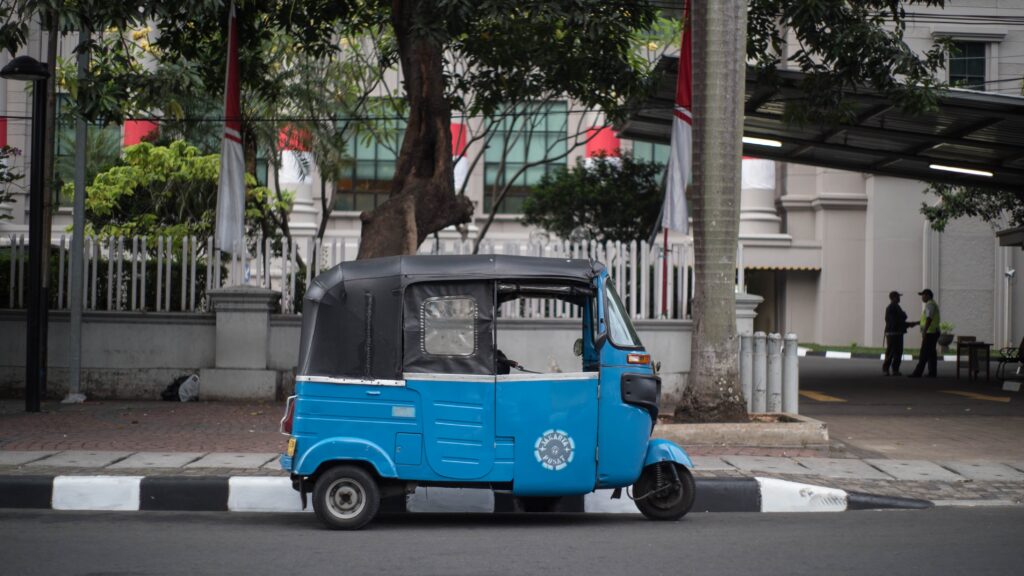This UK PACT (Partnering for Accelerated Climate Transitions) project provides technical support and enhances the capacity of Indonesian national and sub-national governments to develop, finance, implement, and accelerate low carbon transport policies and plans that meet the mobility needs of marginalized groups.
2022–2025
Mixed transport modes in the centre of Jakarta, Indonesia. Photo: Ngrh Mei / Pexels
Inclusive low-carbon transport in Indonesia is one of five projects selected as part of the Indonesia-UK PACT (Partnering for Accelerated Climate Transitions) low-carbon cities and transport call for proposals, reaffirming the UK-Indonesia collaboration on transport.

3 wheeler taxis (motorized rickshaws) are prevalent in Indonesian cities. Photo: Rezal Scharfe / Unsplash
The Stockholm Environment Institute at the University of York (UK) is leading the project in collaboration with the United Nations Environment Programme (Nairobi, Kenya/Bangkok,Thailand), Clean Air Asia (Manila, Philippines/Jakarta, Indonesia) and the Centre for Transportation and Logistic Studies (Pustral) at Gadjah Mada University (Yogyakarta, Indonesia).
The project contributes to the Indonesian Ministry of Transportation’s (MOT) plans to reduce urban transport carbon emissions, as well providing support to Greater Medan authorities to develop, finance, implement, and accelerate inclusive, low carbon transport projects.
It focuses on the metropolitan area of Greater Medan in North Sumatra Province, which includes neighbouring Binjai City, Deli Serdang Regency, and a part of Karo Regency. It will support Greater Medan in integrating walking, cycling with public transport; participatory methods to include women and other marginalized groups in transport planning; and implementing a transit-oriented development (TOD) approach to maximize residential, business and leisure space within walking and cycling distance of public transport.
By providing support to the MOT and sub-national governments the projects contributes to:

Inclusive transport provision for women in Indonesia. Photo: @ranggcahya / Unsplash
To achieve this, the project will provide technical support and enhances capacity across 4 interlinked focus areas:

Developing the evidence base through:

Developing the evidence base through:

Focused on Greater Medan


SEI-UoY has extensive experience of providing evidence to support policy development and implementation. It has undertaken research on transport, road safety, participatory approaches, participatory digital mapping, climate change, air pollution impacts and air pollutant emission inventories and modelling. It has developed the LEAP (Low Emissions Analysis Platform) software to assess the potential of different mitigation measures to reduce air pollution and GHG emissions. SEI-UoY has worked with a wide range of Asian stakeholders and international organisations. It has experience of managing large international projects and networks and organizing high-level multi-stakeholder workshops and events.
PUSTRAL is a leading transportation research centre in Indonesia undertaking research on transport and logistics sector, capacity building and education and community engagement. It undertakes research on the transportation and logistics sector in Indonesia and internationally.
Its expertise covers infrastructure system and management, telematics and information system, policy, institution, and regulation, economic and business, social culture, safety, and the environment. It has experience of undertaking research on a wide range of transport issues in Indonesia and providing technical policy support and capacity building to national and sub-regional governments.
Clean Air Asia is an international non-governmental organization leading the regional mission for better air quality, and healthier, more liveable cities throughout Asia. Clean Air Asia’s mission is to reduce air pollution and greenhouse gas emissions in Asia and contribute to the development of a more sustainable, equitable and healthier region. They empower governments and cities by inspiring action and focusing efforts on the planning and implementation of solutions at scale, fostering regional cooperation to address issues of mutual concern, and ensuring the integration of air quality management across sectors and institutions.
UNEP is the leading global environmental authority setting the global environmental agenda. It has global, regional, and national experience in coordinating environmental activities and assisting developing countries in implementing environmentally sound policies and practices. UNEP’s Sustainable Mobility Unit works with governments to de-couple increased emissions from increased mobility and economic growth, including transit-oriented development.
In Indonesia, the team has strong networks with national government and local partners – particularly with walking, cycling and public transport integration and electric mobility, as well as supporting national policy change.

UK Partnering for Accelerated Climate Transitions (UK PACT)
UK PACT (Partnering for Accelerated Climate Transitions) is a unique capacity-building programme. Jointly governed and funded by the UK Government’s Foreign, Commonwealth and Development Office (FCDO) and the Department for Business, Energy and Industrial Strategy (BEIS) through the UK’s International Climate Finance, it works in partnership with countries with high emissions reduction potential to support them to implement and increase their ambitions for tackling climate change.
In June 2022, the UK Government launched five transformational, UK PACT-funded Future Cities projects to help step up Indonesia’s transition to low-carbon, inclusive mobility and foster economic opportunities.
Indonesia-UK PACT has committed £9 million across three years to finance the portfolio. Working with national and sub-national authorities and communities, these projects will help accelerate the shift away from mass transport to safe and inclusive mobility in several Indonesian cities.
Perspective / This perspective highlights three major solutions to address the challenges faced by low-income and vulnerable transport users in African cities.
1 September 2021 / About Adaptation, Behaviour and choice, Cities, Disaster Risk, Short lived climate pollutants and Transport
Feature / At the Eastern Africa Women in Transportation Conference, SEI joined employees and policy-makers to discuss how to create an inclusive public transport sector.
13 May 2019 / About Behaviour and choice, Participation and Public policy

Feature / Short-lived climate pollutants (SLCPs) can have a big impact on climate change. SEI’s new LEAP-IBC tool shows that cutting emissions also has health benefits.
31 July 2018 / About Cities, Pollution, Short lived climate pollutants and Transport
Design and development by Soapbox.
